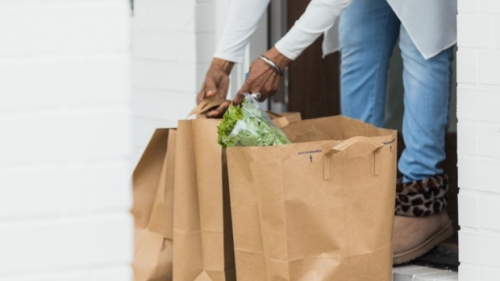Study participants say they don’t trust hired shoppers to select high-quality fruits and vegetables

Getty Images/SDI Productions
Families who are eligible for Supplemental Nutrition Assistance Program (SNAP) benefits are less likely to purchase both healthy foods, such as fresh fruits and vegetables, and sweets when buying groceries online compared to in-store, finds a new study by a team of nutrition researchers.
In 2021, they examined shoppers’ behaviors during a pilot program in which the USDA authorized use of SNAP benefits for purchasing groceries online to increase access to healthy foods among low-income populations. The program was launched in 2019 and expanded in 2020 during the COVID-19 pandemic when people were encouraged to stay in their homes.
“The expansion of the SNAP online policy during the pandemic was important to give equal opportunity to low-income populations to access groceries,” says Assistant Professor Angela Trude, lead author of the study. “However, are SNAP families actually using their government benefits to order groceries online? If so, what are they buying and why? Answering these two questions are key to know whether the federal policy is achieving its intended goal.”
Trude and her co-authors surveyed the primary shoppers for 310 SNAP-eligible families in Maryland (shoppers who did and did not buy groceries online) to evaluate their attitudes toward online shopping and purchasing habits. The authors created an infographic highlighting key findings from their journal article, published in Appetite.
They found that most of the shoppers (57 percent) ordered groceries online at least once and that those who purchased food online were more likely to have positive attitudes toward the service—finding it convenient and reporting that they spend the same amount of money or less than when they shop in-store.
However, the study revealed that shoppers were 70 percent less likely to buy fresh fruits and vegetables, as well as meat and seafood, when shopping online than in person. In interviews, the participants explained that they were less inclined to buy these items because they didn’t trust hired shoppers to select high-quality products.
Shoppers were also less likely (49 percent) to purchase sweets (e.g., candies, cookies, cake) when they bought groceries online. Participants told researchers that online shopping allowed them to avoid impulse purchases and freed them from pressure by their children to buy sweets.
“Online grocery shopping is a promising tool to reduce issues of food access, but our study shows that this might be leading to reduced purchases of healthy foods, driven in part by uncertainty and distrust in how these products are selected,” says Trude. “This data will be important in advocating for improved retail practices and policies such as training of online hired shoppers, explicit return/refund rights, and waiving delivery fees for SNAP customers.”
This study was supported by a grant from Healthy Eating Research, a national program of the Robert Wood Johnson Foundation.

